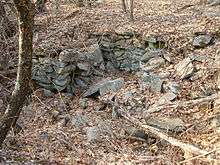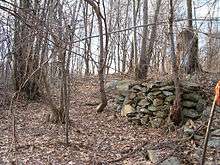Hanton City, Rhode Island

Hanton City (known locally as Lost City) is a colonial era ghost town in Smithfield, Rhode Island, United States.
The remains of Hanton City consist of several stone foundations, a burial site, a defunct dam apparently used for irrigation, and a dilapidated scattering of stone walls, typifying it as a standard small New England farming community. The entire site is completely overgrown, making it nearly impossible to locate when any vegetation is present.
At the time of its habitation, the small settlement was extremely isolated from the main town of Smithfield. For this reason, several theories have been posited in regards to its raison d'être.
The first theory is that the residents of Hanton City were a small band of runaway slaves united to live in secrecy in the wilds of then extremely rural Smithfield. This theory seems unlikely given the logistics of a renegade group of people's ability to procure the building materials and basic supplies needed to create even the most rudimentary settlement (let alone the outside goods required to maintain day-to-day life).

The second theory is that the residents of Hanton City were all pariahs afflicted with a communicable disease that mandated their isolation from the general populace.
The third theory is that those who founded Hanton City were Loyalists: colonists who remained loyal to the king of England during the American Revolution. It is uncertain whether these Loyalists were forced to live in exile by the historically fiercely independent Rhode Islanders or whether they chose of their own volition to form an enclave of the politically like-minded. Several Tories from Newport were exiled to Smithfield and Glocester in 1776, including Thomas Vernon whose diary was published.[1]
The wooded area in which Hanton City is located is currently owned by The Dow Chemical Company. The presence of orange surveyor's tape suggests the area's imminent development. The small Alfred Smith Cemetery is located in the area.[2] The only readable names are Alfred, Eliza and Emor Smith. "Hanton City Trail" in Smithfield and "Hanton Road" in North Smithfield serve as reminders of the now defunct village.
Further reading
- Vernon, Thomas, The diary of Thomas Vernon [microform] : a loyalist, banished from Newport by the Rhode Island General Assembly in 1776 : with notes / by Sidney S. Rider (Providence: S.S. Rider, 1881).[1]
External links
- 1 2 Thomas Vernon, Sidney Smith Rider, and Harrison Ellery (2009). The diary of Thomas Vernon, a loyalist, banished from Newport by the Rhode Island General Assembly in 1776. Nabu Press. p. 166. ISBN 1-178-25450-X. Retrieved 2010-10-26.
- ↑ "Smith Family Graves in Smithfield, RI". Retrieved 2010-10-26.
